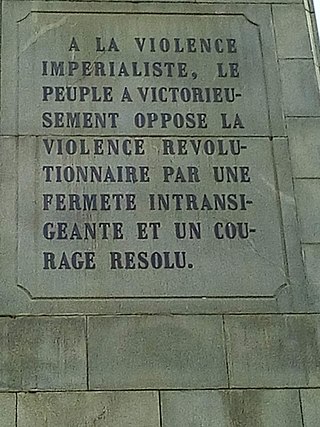Related Research Articles

Ahmed Sékou Touré was a Guinean political leader and African statesman who became the first president of Guinea, serving from 1958 until his death in 1984. Touré was among the primary Guinean nationalists involved in gaining independence of the country from France. He would later die in the United States in 1984.

Boubacar Diallo Telli was a Guinean diplomat and politician. He helped found the Organisation of African Unity (OAU) and was the second secretary-general of the OAU between 1964 and 1972. After serving as Minister of Justice in Guinea for four years he was executed by starvation by the regime of Ahmed Sékou Touré at Camp Boiro in 1977.
Camp Boiro or Camp Mamadou Boiro (1960–1984) is a defunct Guinean concentration camp within Conakry city. During the regime of President Ahmed Sékou Touré, thousands of political opponents were imprisoned at the camp. It has been estimated that almost 5,000 people were executed or died from torture or starvation at the camp. According to other estimates, the number of victims was ten times higher: 50,000.
Trade unions in Guinea were historically important - having played a pivotal role in the country's independence movement - and in recent years have again assumed a leading role.

Ismaël Touré was a Guinean political figure and the half brother of President Ahmed Sékou Touré. He was the chief prosecutor at the notorious Camp Boiro.
Moussa Diakité was a Guinean politician during the presidency of Ahmed Sékou Touré. He was a member of the national Politburo. His wife, Tata Keïta, was half sister of the President's wife Andrée, and his son married the eldest daughter of Ismael Touré, the president's brother.
The Cabinet of the First Republic of Guinea was the governing body of Guinea from independence on 28 September 1958 until the death of President Ahmed Sékou Touré on 26 March 1984, followed by a bloodless coup by Colonel Lansana Conté on 3 April 1984. For much of that time, the country was run by a tight-knit inner group, many of them relatives of Sékou Touré, who became the primary beneficiaries of the regime.

Mamadi Keïta was a leading Guinean politician and member of the Politburo of the First Republic of Guinea.

Loffo Camara was a senior Guinean politician and a member of the Politburo of the First Republic of Guinea in the years immediately following independence. After falling out with the President Sékou Touré, she was dismissed from the cabinet, and later was arrested and executed.

Abdoulaye Touré was a politician in the first Guinean republic. He was arrested after a coup in April 1984, and was executed in July 1985.
Alioune Dramé was a Guinean economist and politician. He also served as an ambassador to Ivory Coast.

Lansana Diané was a general and a minister in the cabinet of Ahmed Sekou Touré, President of Guinea during the First Republic (1958–1984). The military government that took power after Touré's death executed him in 1985.
Alpha Oumar Barry (1925–1977) was a Guinean politician, a member of the cabinet of President Ahmed Sékou Touré in the first Guinean republic, who was later arrested and died at Camp Boiro.

Siaka Touré (1935–1985) was the commandant of Camp Boiro in Conakry, Guinea during the regime of Guinean President Ahmed Sékou Touré. During this period, many of the president's political opponents died in the camp.
Jean-Paul Alata was a Frenchman who was a political prisoner in Camp Boiro, Guinea from January 1971 to July 1975, later writing a book about his experience which was banned by the French government.
The Ignace Deen Hospital is a hospital in Conakry, Guinea built during the colonial era. The hospital is situated next to the National Museum.

The Monument du 22 Novembre 1970 is a monument in Conakry, Guinea that celebrates the defeat of the attempted coup led by Portuguese troops in 1970, named Operation Green Sea.
Mahmoud Bah is a Guinean political activist and writer born to the Fulani tribe. He is best known as one of the figures Amnesty International were eager to release during his imprisonment in the Boiro Mamadou Concentration Camp between 1979 and 1984 after campaigning in France as part of the Rassemblement des Guinéens de l'Extérieur.
Saliou Coumbassa was a Guinean politician and educator.

The 1984 Guinean coup d'état was the bloodless military coup that took place in Guinea on 3 April 1984, led by Colonel Lansana Conté. It led to the deposition of Prime Minister Louis Lansana Beavogui, who had held the office since 1972, and had been serving as interim president since March, when longtime President Ahmed Sékou Touré died during an emergency heart operation at the Cleveland Clinic in the United States.
References
- ↑ Lewin, André (2010). Ahmed Sékou Touré (1922-1984) Président de la Guinée de 1958 à 1984. Editions L'Harmattan. p. 251. ISBN 978-2-296-11254-4.
- ↑ Momar Coumba Diop (2002). La société sénégalaise entre le local et le global. KARTHALA Editions. p. 469. ISBN 2-84586-319-5.
- 1 2 Politique Africaine n°10 - Les puissances moyennes et l'Afrique. KARTHALA Editions. p. 130. ISBN 2-8111-0107-1.
- ↑ Maurice Jeanjean (2004). Sékou Touré: un totalitarisme africain. Editions L'Harmattan. p. 150. ISBN 2-7475-7657-4.
- ↑ Amadou Diallo (1983). La mort de Diallo Telli. KARTHALA Editions. p. 78. ISBN 2-86537-072-0.